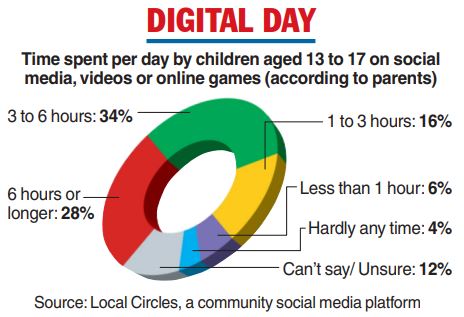Over a quarter of adolescents aged 13 to 17 years spend six hours or longer per day on smartphones or digital devices, according to a nationwide survey that experts say has deepened concerns about digital-era addictions.
The survey, based on responses from 9,633 parents from 287 districts, has found that 28 per cent children spend six hours or longer, and 34 per cent between three and six hours, on digital devices.
Among a subset of 8,200 urban parents, 71 per cent reported that their children had access to either a smartphone, desktop, laptop or tablet “for all or most part of the day” outside their in-person classroom times.
“Children’s time on digital devices had increased during the pandemic,” said Sachin Taparia, whose platform conducted the survey.

“Our findings suggest that staying online has become more widespread now than before,” added Taparia, founder and chief executive officer of Local Circles, a community social media platform that conducted the survey. The findings were released on Thursday.
About 44 per cent of a subset of 7,900 urban parents told the survey that their children were addicted to social media or online gaming or videos (the sizes of the subsets differ because not every parent answered every question). Only 15 per cent of parents of children aged 9 to 17 years had reported their children as addicted in a similar survey in 2019, Taparia said.
Health experts not associated with the survey said its findings provided fresh evidence of social media addiction among adolescents, a trend already documented in the country and described by some as a health concern.
A study by community medicine specialists from the Maulana Azad Medical College, New Delhi, that was published earlier this year had found mobile phone addiction in 33 per cent among a sample of 266 children, aged 10 to 18, in the city.
Earlier studies too had revealed near 30 per cent addiction among samples of schoolchildren in Navi Mumbai and Haryana.
The Delhi study had found that 17 per cent children had a hard time concentrating in classes, or while doing assignments or while working because of mobile phone use. Some 41 per cent preferred talking with smartphone “buddies” to hanging out with real-life friends or family.
“Such results raise concerns, but the long-term implications of such addiction remain unclear,” said Saurav Basu, a community medicine specialist at the Public Health Foundation of India, New Delhi, and a member of the Delhi study team.
“The concerns relate to the possible impacts, if any, on social relationships, on academic outcomes, and on non-communicable diseases due to increasingly sedentary lifestyles. But to explore these angles, we need cohort studies that follow up on young people for many years.”
About 68 per cent among a subset of 7,800 urban parents told the Local Circles survey that they wanted the age for social media accounts raised from the current 13 years to 15 years.
“We plan to share the findings with the National Commission for the Protection of Child Rights,” Taparia said.
The NCPCR, the apex child rights body, had released a study last year that had found that 37 per cent of 10-year-olds had Facebook accounts and 24 per cent of 10-year-olds had Instagram accounts.
“This is seemingly in contravention to the guidelines laid down by various social networking platforms,” the NCPCR had said, underlining that Facebook and Instagram had set a 13-year age barrier for accounts and calling for “proper oversight and stricter enforcement”.












